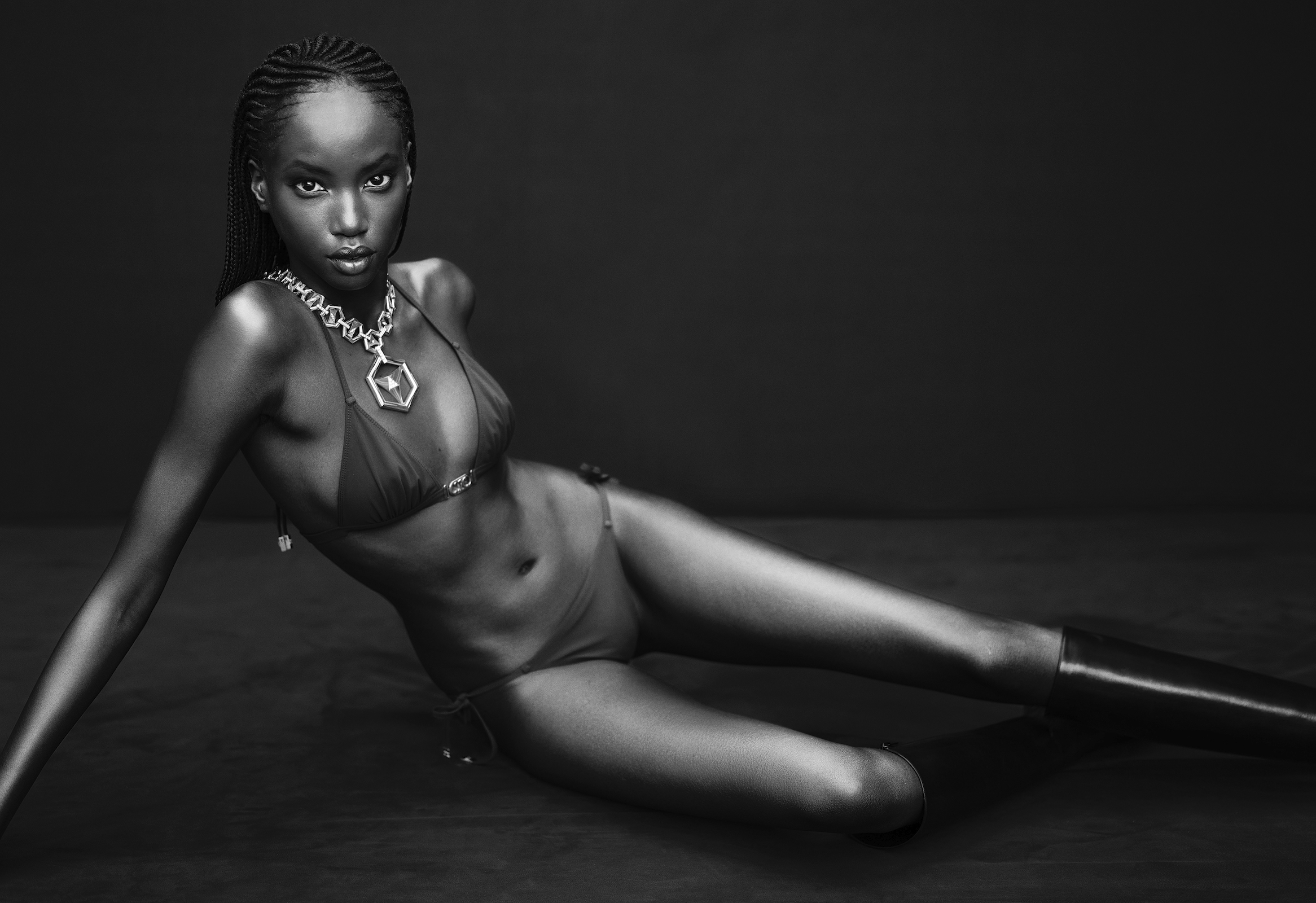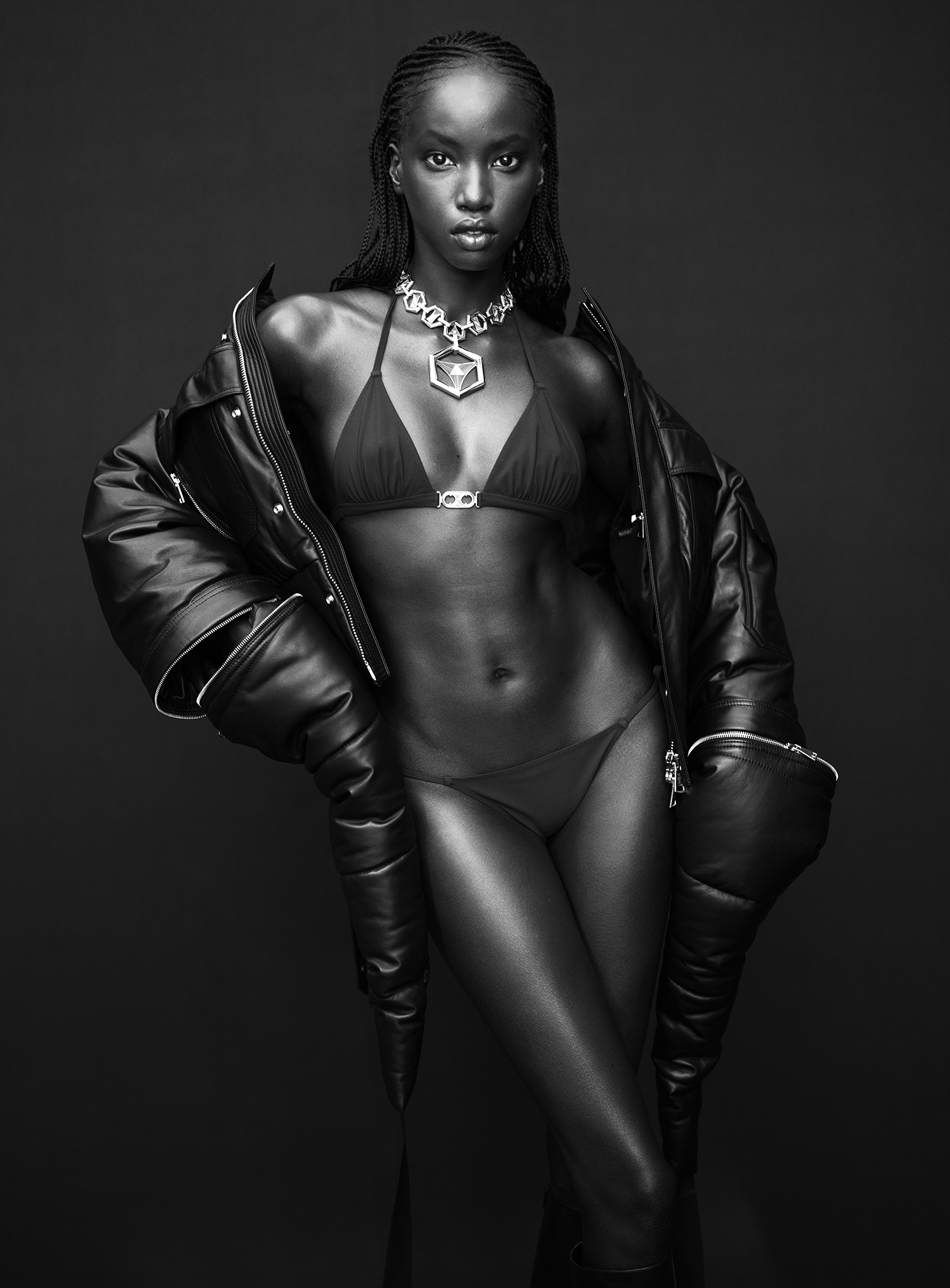V130: Supernova Summer With Anok Yai
In conversation with iconic supermodel Iman, Anok Yai opens up about her skyrocketing modeling career, keeping it real on social media, and taking accountability for Black representation in fashion.

This cover story appears in V130’s SUPERNOVA SUMMER ISSUE on sale now!
The word “legend” is overused in this industry, yet Iman Abdulmajid truly deserves that title. Raised in Somalia and first scouted in Nairobi in 1975, Iman became one of the faces that defined fashion for the next five decades, bringing a stately elegance to every runway and closely collaborating with Yves Saint Laurent and Thierry Mugler. As her star rose, she never lost sight of her sense of justice. Upon finding out that her pay packets were slimmer than those of her white peers, she became the first Black model to refuse to work for a lower wage. And, frustrated by the lack of makeup options available for women of color, she started Iman Cosmetics in 1994, which paved the way for today’s more inclusive beauty industry.
Forty years after Iman’s rise, the career of supermodel Anok Yai is also defined by firsts. Discovered on Instagram after being snapped at Howard University’s homecoming, in 2017 she became the first Black woman to open a Prada show in more than two decades. She’s racked up countless magazine covers, luxury campaigns and followed in Iman’s footsteps to help expand the world’s definition of beauty. This April, the pioneering pair hopped on the phone to speak about Yai’s start in fashion, diversity in fashion, and the importance of breaking boundaries.
Iman Abdulmajid: I am beyond honored to be interviewing you.
Anok Yai: I am so excited that you’re interviewing me. I’ve always looked up to you and take so much inspiration from you and the women of your time, so I want to thank you for paving the way for us younger Black models.

IA: So, you go from a young girl that has been discovered on social media, and all of a sudden you are up front. You open for Prada within months. What was that transition like? And how long did it take for you to feel comfortable, entirely, in this new world?
AY: Yeah. So, I remember actually, backstage at the lineup, I had a panic attack. The stylist, Olivier, he came up to me and was like, “Are you ready?” And I was like, “No, no, I can’t. I don’t know.” And I was so nervous that I actually forgot what the runway looked like. I had been preparing to walk this show. So, at the last minute, I just went out. Right when you get on, all the nerves rush away. It’s just you and the runway and the lights. It felt amazing. I mean, it took a while for me to get comfortable, because it was so different from being a student. Jumping into the high-fashion world, [everything] is so different. You have to navigate it, basically alone, because you’re a teenage girl travelling from job to job. No one can be there to hold your hand. But I’ve learned a lot from the industry, and I’ve learned a lot about myself. Luckily, I have girls on my side so that I can build a community with other Black girls backstage. Make it less of a strange place, you know?
IA: So what does it feel like when modeling, now, in a digitally-driven world? Because you’re a young girl who is now at the height of Instagram. Does Instagram mean a lot in fashion now, especially for models?
AY: I have so much control of my image and how I choose to present myself to the world. With modeling, you’re given these characters, and you have to become that character for whatever photoshoot or runway that you’re doing. With how the world is today, I’m able to curate and decide my imagery through the power of social media. I’m very meticulous about what I do, how I present myself, and how much access I give the world. I’m a perfectionist. I need to have control of everything going on around me.
IA: What kind of a career do you want to have?
AY: I just want to share my art. For the past few years, I’ve been quietly expanding myself as a model, an entrepreneur, and artist. At the moment, I’m working on a few things. I’m currently keeping them under wraps, but once I have everything perfected then I’ll release it. But I will say, I have some paintings that I’m working on, and I’m hoping to release them by the end of this year.
IA: Social media has brought a reckoning, and a way to put a light in the dark sides and shadows of our industry. How do you feel? Because you are in the forefront, you young models. You’re the foot soldiers at the front of the line. What do you think is happening?
AY: I feel like a lot of the progress in the industry was a result of social media. People are holding brands and creatives accountable to their word. So much power comes behind having such a social media presence. If your voice is strong enough you can change anything. For example, during the protests, I was very active. I posted the photo of me at a protest to support [the movement] after the killing of George Floyd. I remember there being so much pushback from some creatives and brands trying to force me to take down the post because of how controversial it was. I got pressure from all sides. It’s just one of those things where you have to stand your ground regardless of who’s against you.

IA: Yeah. And, what do you think should change? Where do you see that change is happening?
AY: I mean, obviously there’s more inclusivity. I am happy that there is more body-positivity in the fashion industry! When I first arrived to the world of fashion, I remember specifically, there was one day when I was backstage, and I heard someone speaking Dinka! I went looking for that voice, and I saw a group of younger South Sudanese girls. It was so crazy to think that so many girls of my skin color and of my tribe were there, doing this one show. There’s no more tokens. It’s not just one Black model. And that’s when I noticed, and I was like, ‘Yeah. Shit is changing.’
IA: There was a different pay rate at that time. I refused to work. I took a three-month hiatus and said, “I am not working until I am paid for services rendered. It wasn’t about Black and white. It was like, I’m doing the same job, so why am I not getting paid the same rate? So they changed that. I feel—and I will ask you—I feel that I see the changes in the magazines, in the editorials and all that, but the decision-making positions need to change a bit, right? People who bring in the creatives that are out there, but are not monetized. The first time Vanity Fair had the first Black photographer was with Viola Davis, and I’m like, ‘How many years old is Vanity Fair? And this is the first Black photographer?’ What’s your take about the decision-maker positions, people who make the decisions?
AY: I think, of course, that it needs to change. And I think that, right now, I’m noticing a lot of “the first Black creative to do this, the first Black creative to do that,” it makes me think, “This whole time, you’ve never had a Black person do this?” I constantly get asked this question of, “Do you think there should be more inclusivity on the runway?” And I tell them, “This is not a question for the models.” Because I can only do so much. It has to be up to casting directors and creatives to decide that. But also, I feel like my way of changing that is that I make an effort to hire as many people of color as I can to be on my team. Whether it’s glam or finance or photography, everything. Whenever I see someone talented, and people don’t appreciate their art, I’m like, ‘Let’s work together. I’ll bring you up with me and we can do this together.’
IA: So, on a lighter note, this is the V summer issue. What are you looking forward to this summer?
AY: I am looking forward to the world opening back up. At the beginning of the pandemic, I never anticipated how much turbulence the world would go through and for how long. I’ve definitely learned to appreciate my relationships a lot more. With the high fashion industry being forced to slow down I’ve been able to put more time into my other passions which I’m excited to start releasing this summer.
IA: So, what would you say to the hordes of young readers who look up to you today?
AY: I would say that every opportunity that comes your way is your chance to evolve, be prepared and stay driven.
IA: Well, I’m very proud and honored to be interviewing you. I can’t wait to see your work.
AY: Thank you so much. It’s been an honor to speak to you. I’m about to call my mom; she’s gonna lose her mind when I tell her about this.
Discover More
